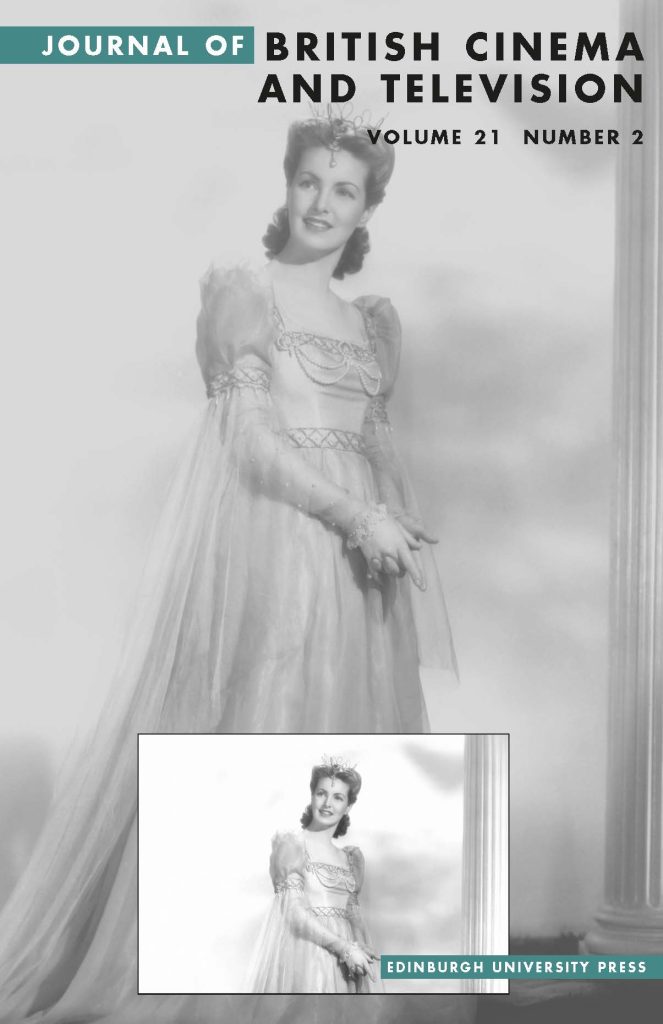
by Misha Nguyen, Book Reviews Editorial Assistant (De Montfort University)
The upcoming Spring and Summer editions of the Journal of British Cinema and Television, Volume 21.2 & 21.3) promise another bumper crop of book reviews, offering valuable insights into recent scholarly works.
Issue 21.2 begins with the book that is likely to be regarded as the definitive account of post-war British film finance: The Money Behind the Screen: A History of British Film Finance, 1945-1985 by James Chapman. As reviewer Justin Smith observes, while various studies have delved into the contemporary landscape of British film production and finance, Chapman’s historical examination excels in its forensic analysis of film policy, the evolving relationship between cinema and the state in Britain, and the roles of public and private institutions.
Next up, Folk Horror on Film: Return of the British Repressed, edited by Louis Bayman and K.J. Donnelly, as reviewed by Vic Pratt. While numerous recent titles explore this genre internationally, this book reasserts a focus on examples from British cinema. In the introduction, the authors mention their aim to establish a clear definition of the term ‘folk horror’ and to examine it from a sociological perspective, focusing on its portrayal of class-consciousness and fear of ‘the folk.’ Inevitably, perhaps, The Wicker Man (1973) looms large in the first third of the collection. Chapters in Part 2 cover an eclectic range of films from 1972’s Doomwatch (by Dawn Keetley) to Amy Harris’s focus on female-directed low-budget horrors Following the Wicca Man (2013) and Maya (2021). The final section deals with ‘Folk horror’s cultural landscapes’. According to Vic Pratt, despite the contributors’ dogged pursuit of the term ‘folk horror’, ultimately it evades capture. But the chase is rewarding indeed.
21.2’s reviews section concludes with an extended appreciation of The Films of Laura Mulvey and Peter Wollen: Scripts, Working Documents, Interpretation, an impressive career overview of the theorists, critics and film-makers edited by Oliver Fuke, and reviewed here by Claire M. Holdsworth. This compilation brings together the scripts and working documents which are each complemented by a new essay from a prominent writer, providing a critical interpretation of the film in question. This publication, according to Holdsworth, stands out as the first to record in detail their remarkable working methods and explore their richly layered films in depth. The various styles and formats showcased here reveal Mulvey and Wollen’s diverse roles as artists, critics and theorists, counterbalancing any possible over-emphasis on their theoretical writing. Insight into their personal dynamics, from collaboration to separation, is highlighted, with Mulvey acknowledging potential differences in perspective.
Later this year, issue 21.3 will offer an eclectic mix, including: James Bond Will Return: Critical Perspectives on the 007 Film Franchises, edited by Claire Hines, Terence McSweeney and Stuart Joy, (reviewed by Andrew Spicer); Jez Stewart’s The Story of British Animation (reviewed by Malcom Cook); UK and Irish Television Comedy: Representations of Region, Nation, and Identity, edited by Mary Irwin and Jill Marshall, (reviewed by Rosemary White); Adrian Brunel and British Cinema of the 1920s: The Artist versus the Moneybags by Josephine Botting (reviewed by Martin Stollery); Once Upon a Time Lord: The Myths and Stories of Doctor Who by Ivan Phillips, (reviewed by Paul Booth); and Jeffrey Richards’ review of Alex Rock’s The Metropolitan Police and the British Film Industry, 1919-1956: Public Relations, Collaboration and Control.
Surveying these reviews, what impressed me most was that the study of comedy in the UK and Ireland focuses attention on how comedy reflects and shapes regional and national identities; that animation stands out as a remarkable success story in contemporary British media; that meticulous archival research results in a subtle and compelling appreciation of Adrian Brunel’s career contribution to British Cinema, featuring striking illustrations; and that by employing mythographic theory, Ivan Phillips delves deep into the intricate interplay between history, mythology, and the multifaceted world of Doctor Who spanning over 57 years. For Paul Booth, ‘Phillips’ task may be impossible, it is also miraculous’. My own was a pleasure.
The ABC of a good book review:
A. Address the text
Read the book in its entirety. It’s important you have a thorough appreciation of the text before you construct your review. Make notes that signpost the main areas you want to address in your review and summarise key sections and central arguments. If a book is genuinely innovative or idiosyncratic, do note this. It is crucial that your review is written in clear English, avoiding jargon, eccentric phrasing and unnecessary verbosity. Your aim is to communicate directly with our readers, and to describe the book’s coverage succinctly.
B. Bring out the context
What’s the book about and who is it for? Set out clearly the central subject of the book, its structure, the topics covered, the sources utilized and the methodology employed. Is it written within a particular conceptual or theoretical framework? What areas of previous scholarly research does the study elaborate on or challenge? If you were to summarise the overall contribution of the book to the field, what would it be? The review should locate the new publication within its context. Where appropriate, do make references to extant work since this helps to situate the book in its field and demonstrate its originality.
C. Criticise constructively
The Journal is looking for reviews of books, not opinion pieces. The review is about the book under scrutiny and not the reviewer. So, don’t use the review to publicise your own work or, worse, to settle academic scores. Reviewers should always express criticism respectfully. Negative comments can be included but should be couched sensitively and be proffered in the context of whether the book has demonstrated originality, developed its central thesis, used appropriate methods and given evidence for its arguments. It is perfectly legitimate to point our factual inaccuracies, typographical errors and any other form of poor presentation. But an author can’t be blamed for not having written the book you wanted or that you would have written. Judge the work on its own merits, rather than pursuing your own agenda. If, having read the book, you feel you can find nothing constructive to say, please alert the reviews editor as soon as possible to avoid wasting time and effort.
Sign up to our mailing list to keep up to date with all of our free content and latest releases

About the Journal of British Cinema and Television
The Journal of British Cinema and Television is indispensable for anyone seriously interested in British cinema and television. Themed issues alternate with general issues, and each issue contains a wide range of articles that encourage debate.
Sign up for TOC alerts, subscribe to Journal of British Cinema and Television, recommend to your library, and learn how to submit an article.





